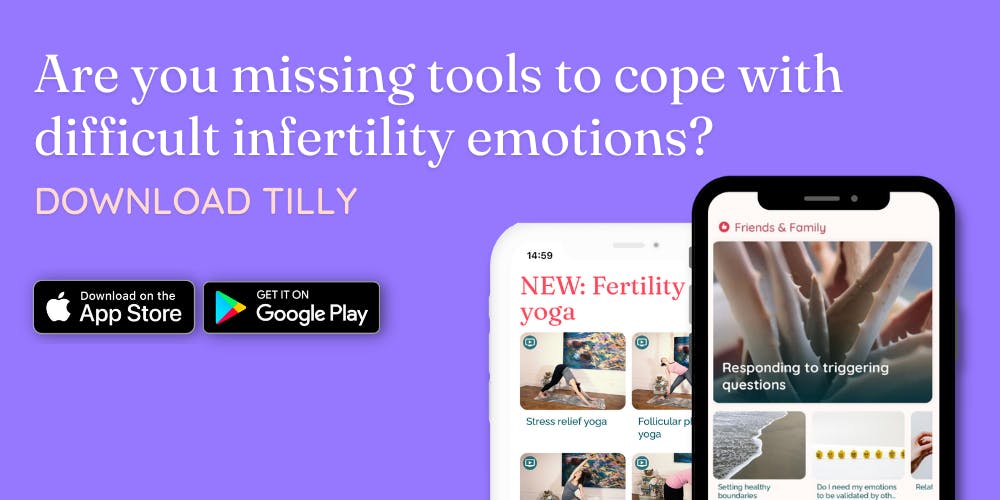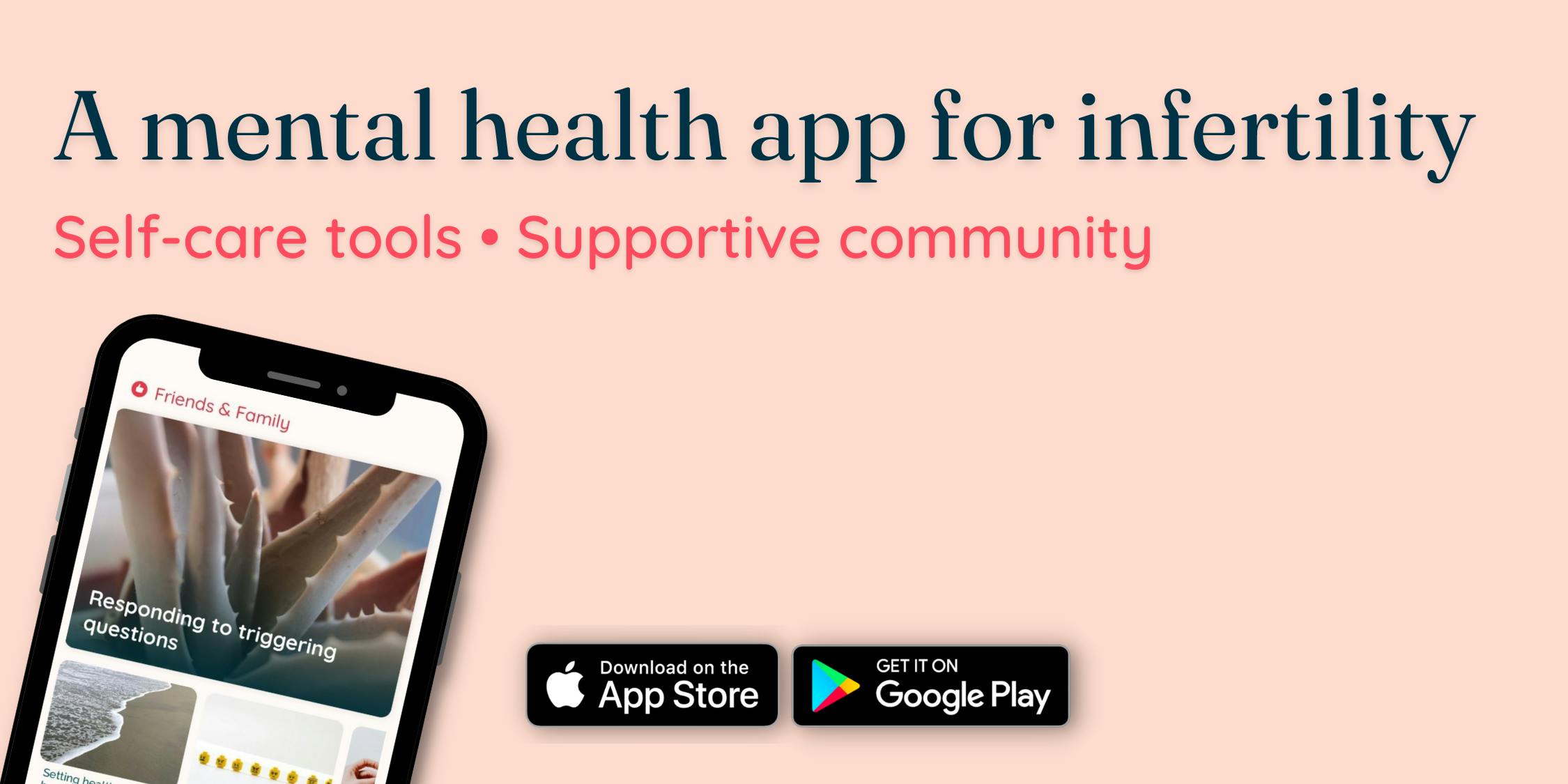Why we struggle to socialize and attend events when we face infertility
Do you feel like your days of being a social butterfly are behind you? Saying "yes" to attend certain events fills you with dread instead of excitement. Even a phone call or coffee with a friend feels like more social interaction than you can take right now. You daydream about crawling into a pile of blankets where no one can reach you.
Infertility can have that affect on you. Struggling to conceive and going through fertility treatments can be a life crisis, and during difficult times, socializing often becomes daunting and triggering.
It's okay to feel this way. You are not the only one, and you are not alone. And chances are, these feelings will not last forever.
Do you feel overwhelmed by social interactions?
We're going to look at some reasons why socializing or attending events feel hard these days. And then help you figure out when it's okay to hunker down at home, and when it's a good idea to step outside your comfort zone.
Why don't I want to go to social events?
Let's start by clarifying one thing: when we experience something difficult and feel overwhelmed, it can be healthy to want to be alone in order to feel our feelings and think our thoughts. Slowing down and turning inward instead of trying to get rid of emotions by doing a million other things might be a good idea.
Also, you may be naturally introverted or don't particularly enjoy small talk regardless of how you feel.
But there'a difference between taking space to nurture yourself, and completely isolating yourself. Infertility can amplify any hesitation that you have when is comes to social gatherings and reaching out for support. Why?
1. Feeling like no one understands
Even though infertility affects 1 in 8 couples, it can be hard to find people who have gone through it, or are going through it now, who are open about talking about it with you. That is, if you even want to talk about it in the first place.
You might have friends who have multiple children, or friends who are years away from trying to conceive. If the people around you are in different stages of their lives, you might feel alone in what you're going through.
You might want to be totally distracted from infertility, but your friends and family keep wanting to talk to you about it. Or the opposite might be true: you really need to talk about what you're going through, but no one in your life seems to be up for the conversation, and they keep changing the subject.
Also, when your life feels anything but ordinary, sitting around and listening to "ordinary conversation" may make you feel even more alone.
2. Avoiding invasive questions and advice you didn't ask for
Regardless of how open you are with your infertility journey, you might come across questions and advice from others that are triggering. Just anticipating these questions and conversations might make you want to stay at home. For example, if your treatment recently failed, you may not be ready to respond to questions about things are going.
Do people ask you, "When will you have kids?"
People love asking timing questions. They want to know about your schedule and timeline for having kids, especially as it relates to other milestones in life.
- "Do you want to have kids?"
- "When are you going to have kids?"
- "When are you going to give us a grandchild already?!"
- "You've been married for 3 years, isn't it time you have kids?"
Unfortunately, it doesn't occur to most people that you might already be trying and are having trouble.
The "have you tried" questions
These often come from a good place, wanting to be helpful, but can come off as condescending or ignorant.
- "Have you tried this new herbal supplement?"
- "Have you tried to relax?"
- "Why don't you try just not thinking about it?"
- "Do you think fertility yoga would do the trick?"
- "Have you considered surrogacy, adoption, or [something else unrelated to your experience]?"
You have likely spent hours and hours educating yourself about your treatments and options, so the idea of having to educate people who likely have no idea what they're talking about probably doesn't appeal.
3. Many social events concern babies or pregnancies
Being around pregnant people and babies can be triggering because it's a reminder that you don't have something that you long for so deeply. And even if you don't know other people's journeys to parenthood, it's easy to assume that they all had a much easier time than you, leading to feelings of envy and resentment.
It is completely understandable that being invited to events for other people's children can make you want to run for the hills.
4. Anxiety and depression make social settings daunting
For most of us, infertility causes feelings of despair and anguish, and studies show that between 25-60% of people with infertility have symptoms of anxiety and depression at some point.
It may be comforting to understand there could be clinical causes behind your lack of desire to be social. Anyone experiencing depression and anxiety is simply less likely to want to socialize.
With anxiety, being out in the world and around people can be overwhelming. When it comes to depression, the tasks required for interacting with people - like leaving the house - can feel insurmountable.
When staying home is caring for yourself
Forcing yourself to go to baby showers, or spend time with a friend who has no concept of boundaries or respect, is most likely not going to be good for you.
What are healthy boundaries?
Setting healthy boundaries with the people in your life is about honoring what you need. We are social beings, wired for human connection. And for social and romantic relationships to thrive, communicating what we need is key.
If we can't tell others what we need and set healthy boundaries, then anger, resentment and guilt easily build up.
It's important to be in tune with yourself, and to be okay with saying "no" to social events that you know won't serve you. Setting boundaries and saying "no" to things might feel selfish. But when you are expressing what will be best for you, that is an act of kindness for everyone:
- You are honoring yourself by knowing and expressing a need.
- You are demonstrating to the other person that you value your relationship by actively investing in shaping it.
So when you believe an event or social experience is going to push you out of your sense of safety, or trigger you into feeling overwhelmed or out of control, it's okay to stay home.
When to push yourself to get out there
But we can't always stay home. Supportive social interactions are key when you have to cope with something difficult, and isolation can increase the difficult feelings you already have with infertility. You may find that with the right tools, preparation and circumstances, social events can give you energy, even if it doesn't feel like they will before you go.
It's true: many people simply don’t know how to be sensitive or supportive when it comes to infertility. But this doesn’t mean that you can’t still have a relationship with these people.
You can maintain relationships with people you like without inviting them into your infertility process, or without them being your go-to people for support.
It can be helpful to remind yourself that different relationships can have different purposes. When you face infertility you may have to set boundaries with some people that you generally consider close, and instead find a different support network from your usual one in online forums or support groups.
You may have to challenge yourself when you find an urge to isolate yourself. You can try using journaling to help you distinguish between things that are likely to trigger you into feeling unsafe, and if there are things you can do to make the setting more comfortable for you. Perhaps you can text your friend beforehand to let them know that you don't want to talk about your fertility, or be asked how the last treatment went.
Try these exercises in Tilly's app...
About the author
Maya Maria Brown, M.A., is an infertility mental health expert. She has a master’s in Counseling Psychology, and has worked with individuals and couples on infertility and relationships. She also has personal experience with infertility and is currently in treatment.
2022-11-22
A mental health app for your fertility journey
Evidence-based self-care tools and facts. Supportive community. Treatment tracking.
Previous articles
Breaking the silence: Infertility and stress during stress awareness month
2025-04-14
Exciting news: Tilly is now part of Rhea
2025-03-31
How infertility impacts men's mental health and ways to cope
2024-11-22
Baby Loss Awareness Week: coming together to support those affected
2024-10-14
PCOS and mental health: a crucial connection
2024-09-25
How to support a friend struggling with involuntary childlessness: A guide for loved ones
2024-09-17

